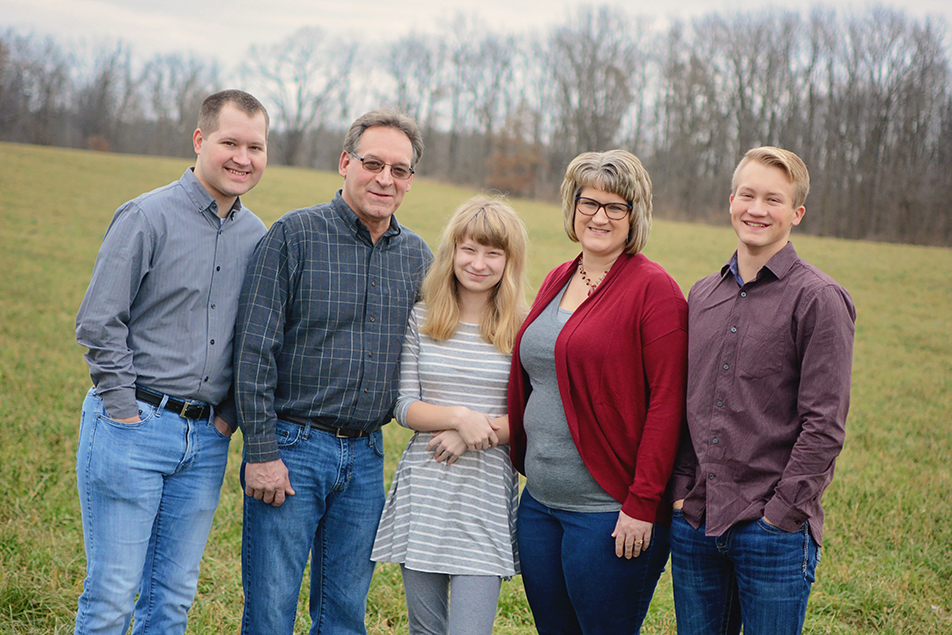
In honor of Congenital Heart Defect Awareness Week, we asked a pediatric cardiologist and one of his patients to speak on their patient-physician relationship. Join us as Shelly Stump shares the intricacies of her son Austin’s story. While simultaneously, Mohammed Ghazali, MD, PPG – Pediatric Cardiology, expands on Austin’s care and his seamless transition into adult cardiology by way of the new adult Congenital Heart Clinic.
What can you share about Austin’s health journey?
Shelly: Austin was born with a heart murmur. It was never a real concern at birth, but his pediatrician said if it were still present at six months of age, we would be referred to a pediatric cardiologist. At six months, Austin’s condition did not resolve, so we went to see a pediatric cardiologist. They discovered that he had a ventricular septal defect (VSD), a small hole in his heart.
Dr. Ghazali: I first saw Austin in July of 2013, when I was with my previous practice, and he was 13 years old. He came to me with a moderate size ventricular septal defect that he’d had since birth. It’s a relatively common problem, with about 50% of patients having complete resolution of the effect by six years of age. Unfortunately, Austin was not a part of that group. He was in the other 50%, whose defect would remain open, seeing no change.
What happened after Austin’s diagnosis?
Shelly: Initially, there were no significant concerns, but Austin’s doctors informed us that they would continue to monitor his defect, making sure the hole didn’t increase in size. The hole has never grown to the point that it would warrant further action. At one point, Austin’s tests were sent to Riley Children’s Hospital several times for review by their team of cardiologists. They never found anything alarming or out of the ordinary. Eventually, we ended up switching pediatricians. The new pediatrician changed us to a new cardiologist within the same network, which is how we met Dr. Ghazali.
What role did Parkview and Dr. Ghazali play in Austin’s healthcare?
Shelly: Austin’s pediatrician referred us to Dr. Ghazali. Throughout Austin’s treatment, we always felt comfortable with him. You can see that he really cares for all his patients. Eventually, Dr. Ghazali sent Austin’s tests to Riley Children’s Hospital for review, and thankfully, they didn’t find anything alarming. Then, in December 2019, Dr. Ghazali sent us to Riley for a second opinion to make sure he wasn’t missing anything, and the cardiologist at Riley agreed with his diagnosis. This information was a relief and a blessing because we were concerned that they would discover something else.
Dr. Ghazali: My responsibility was to watch and see if Austin’s heart defect would have the potential to close as he aged. It did not close and hasn’t since. So, we continued to monitor his condition throughout the years, which could worsen with time. Additionally, my role was to make sure that Austin could continue to grow as a normal child, involve himself in activities, and remain physically active, striving for a normal life quality. The second objective was to verify if any surgical intervention was necessary and if it could be done promptly before transitioning into adult cardiology.
What does this mean for Austin long-term?
Dr. Ghazali: A complicated heart condition, like Austin’s, would require yearly follow up and close monitoring of his defect. As he continues to grow and into young adulthood, we want to keep an eye on any progression and hopefully prevent any surgery if possible.
Shelly: In the long-term, Austin will continue to have annual checkups, as well as cardiologist appointments to monitor his heart condition. As for restrictions, Austin has some regarding high contact sports and weightlifting, but there has never been an issue thus far. In high school, Austin participated in basketball, track and cross-county with no complications. He has even continued to participate in athletics in college, running track, and has had no problem with his heart condition.

Why did Parkview’s Pediatric Cardiology department partner with adult Cardiology to create a Congenital Heart Clinic?
Dr. Ghazali: I joined Parkview a little more than two years ago, and since then, they have been instrumental in helping me take care of my patients. I'm grateful that Parkview and the Parkview Heart Institute decided to start the adult Congenital Heart Clinic. Then, once Sabeena Ramrakhiani, MD, PPG – Cardiology, was on board, who has experience in adult congenital heart problems, the partnership was complete. This partnership allows us to follow up with these young patients and transition them adequately, so there is no discontinuity of care once they leave my practice, or pediatric cardiology, after the age of 20.
You often see the transfer of care from one doctor to the other in the form of a paper chart, but that’s only part of the story. The truth is that we’ve established long-term relationships with these young people, many since birth, or in Austin’s case since he was a teenager. It didn’t feel right, and I felt very uncomfortable just writing a note and passing it and them along.
With this new clinic, Dr. Ramrakhiani will accompany me in seeing these patients as we begin their transition to adult cardiology. Having the other doctor present in the room, taking that role and responsibility as their new physician, really helps reassure and empower patients and their families, knowing they are a part of the process and transition from one doctor or specialist to the next.
Furthermore, this is an exciting service we are providing the people of Northern Indiana. It is the only clinic of its kind that will help with the changeover of these young cardiology patients as they move forward with a new adult cardiologist and care team, who will take exceptional care of them and their needs.
Once patients transition into adult cardiology, will you continue to be involved in their care?
Dr. Ghazali: The truth of the matter is that you never cease being a part of their life. Yes, the transition has to take place, and their new provider will be making the medical decisions for them now, but if at any point their new doctor feels the need for me to be involved, I’d be thrilled and honored to be a part of their care again.
Honestly, it’s extraordinary to know that I’ve been a part of a patient’s life from the beginning, building on a relationship that has been developing their entire life, for which I’m grateful. With that relationship comes a level of trust, which takes time to develop. It doesn't happen overnight. So, in some cases, there may be a little hesitation during the transition, but that’s completely normal. I will always be available if they need me, but I’m glad this clinic will allow them to grow and develop a new relationship with a new provider built on mutual trust and understanding.
What was your transition like from Pediatric Cardiology to adult Cardiology?
Shelly: In all honestly, I was a little worried going into Austin’s appointment this year. I knew it would be his last year with Dr. Ghazali. My concern was trying to find a new cardiologist to transfer him to, and due to COVID-19 protocol, I was unable to attend the appointment with him as I did in years past. Austin had to go by himself this time. Thankfully, Austin called me during his appointment, so we were all on speakerphone together. During the call, I learned that Dr. Ghazali’s team had already arranged and facilitated the transition to adult cardiology. They even had Austin’s new cardiologist present at the appointment, which was a major relief for me. I was extremely impressed with the transition process.
Is there anything you’d like to say to Dr. Ghazali and Austin’s care team at Parkview?
Shelly: Everyone I have ever spoken to in Dr. Ghazali’s office has been easy to work with and very pleasant. Dr. Ghazali has a great personality and truly cares for his patients. He goes above and beyond to make sure his patients and their families are comfortable. He is very thorough and detailed when explaining test results and treatment plans. Furthermore, Dr. Ghazali is a great listener and always asks if you have questions or concerns. Keep up the excellent work!
What would you like to say to Austin and the Stump Family?
Dr. Ghazali: Yes. I want to thank them for the opportunity they gave me to serve and take care of them/Austin for all these years. We use the term “patients,” but they truly become our friends. It’s hard to say goodbye after so many years, but I’m thankful for the time. I want them to know that even though they’re leaving our practice, they will always be in our hearts.
For more information about pediatric cardiology at Parkview Physicians Group – Pediatric Specialties, please call 260-266-5400.



